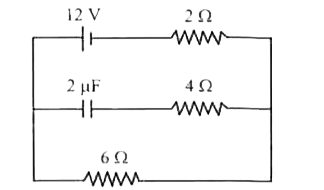A capacitor is charged to a certain potential and then allowed to discharge through a resistance R. The ratio of charge on the capacitor to current in the circuit
changes with time
does not change with time and it is equal to time constant of circuit
does not change with time, but not equal to time constant of circuit
may or may not change depending upon the charge given to the capacitor
The correct Answer is:B
Charge on capacitor at any time is
q=QE−t/τ (i)
Differentating Eq. (i) with respect to time, we get the current
I=dqdt=Qτe−t/τ (ii)
Required ratio is q/I=τ [by diciding Eq. (i) by Eq.(ii)]
Topper's Solved these Questions
- ELECTRIC CURRENT AND CIRCUITBook:CENGAGE PHYSICSChapter:ELECTRIC CURRENT AND CIRCUITExercise:Multiple Correct
Explore 16 Videos
- ELECTRIC CURRENT AND CIRCUITBook:CENGAGE PHYSICSChapter:ELECTRIC CURRENT AND CIRCUITExercise:Comprehension
Explore 35 Videos
- ELECTRIC CURRENT AND CIRCUITBook:CENGAGE PHYSICSChapter:ELECTRIC CURRENT AND CIRCUITExercise:Subjective
Explore 29 Videos
- ELECTRIC CURRENT & CIRCUITSBook:CENGAGE PHYSICSChapter:ELECTRIC CURRENT & CIRCUITSExercise:Kirchhoff s law and simple circuits
Explore 15 Videos
- ELECTRIC FLUX AND GAUSS LAWBook:CENGAGE PHYSICSChapter:ELECTRIC FLUX AND GAUSS LAWExercise:MCQ s
Explore 38 Videos
Similar Questions
Knowledge Check
A capacitor of capacitance 5μF is charged to a potential difference 200 V and then allowed to dischage through a resistance 1kΩ. The cahrge on the capacitor at the instant the current through the resistance is 100 Ma, is (in μC):
A50B100C500D1000Find the charge on the capacitor in the following circuit.
 A12μCB14μCC20μCD18μC
A12μCB14μCC20μCD18μCWhen a capacitor discharges through a resistance R, the time constant is τ and the maximum current in the circuit is i0
AThe initial charge on the capacitor was i0τBThe initial charge on the capacitor was 12i0τCThe initial energy stored in the capacitor was i20τDThe initial energy stored in the capacitor was 12i20Rτ
When a capacitor discharges through a resistance R, the time constant is τ and the maximum current in the circuit is i0. Then,
View SolutionA capacitor is charged and then made to discharged through a resistance. The time constant is τ. In what time will the potential difference across the capacitor decreases by 10%?
View SolutionA capacitor of capacitance C is allowed to discharge through a resistance R. The net charge flown through resistance during one time constant is (I0 is the maximum current)
View SolutionA 5.0 uF capacitor is charged to a potential difference of 800 V and discharged through a conductor. The energy given to the conductor during the discharge is
View SolutionA 5.0 uF capacitor is charged to a potential difference of 800 V and discharged through a conductor. The energy given to the conductor during the discharge is
View Solution


